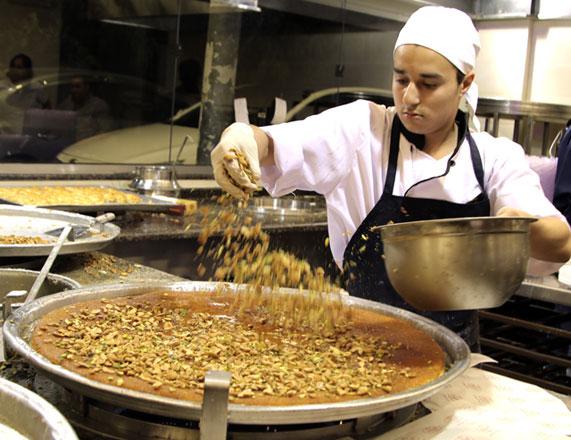You are here
A piece of cake
By Nickunj Malik - Nov 07,2018 - Last updated at Nov 07,2018
Diwali, the festival of lights, is celebrated in Mauritius with a lot of pomp and show. It is such an important event that the whole country observes a national holiday on the occasion. Schools, colleges, government institutions and other offices — everything is shut down as most people get busy in cleaning up their homes and making delicious sweetmeats.
Incidentally, there is no meat in sweetmeat, not even a pinch of it, so if you are wondering why a sweetened piece of dessert is named sweetmeat let me explain. In the past, any sugary delicacy like candy, a slice of fruit coated with sugar and so on — was labelled sweetmeat. The word “mete”, from which “meat” is derived, meant “food” and all items of nourishment, both vegetarian and non-vegetarian, were referred to as “meat”. The original meaning of “sweetmeat” was “sweet food”.
But Mauritians go a step further, and club it all under the umbrella of cake! Unlike the rest of us who define “cake” as a baked dish made from a mixture of white flour, butter, eggs, sugar and dry fruits, which is often topped with frosting and decorations, here, every sweetened dish, whether it is fried, roasted, boiled or poached, is called “gateau” or “cake”. So, in nearly all the vast majority of temples that are scattered throughout this paradise island, the intricately carved idols of the Hindu gods and goddesses are served cake as an offering. During each sacred ceremony, that is.
I was shocked initially, when I heard of this custom, because cake, as I understood it, had eggs as one of its chief ingredients. Besides, even though Hinduism as a religion was pretty flexible, and there were no stringent rules in following it as such, people usually did not carry non-vegetarian food to the houses of worship. I mean, the sensibilities of celestial beings could be offended by such an act and who knew what kind of divine retribution that might lead to? But locally, no one cared too much about ruining their heavenly relations and therefore cakes and pastries were granted easy access in temples.
Soon I discovered that their cake was not our cake at all, even though their gods were the same as ours. When Mauritians gifted you cake, you could expect anything — from the Turkish baklava, Indian laddoo, barfi or rasgulla, Jordanian knafeh or halva, Italian zeppole or French lemon tarts — to appear in the brightly decorated boxes. Only thing missing was what everybody ordered during birthdays and on which candles were placed, lit and blown-out, by the one person whose special day it was. In other words, it can be said that Mauritians were the connoisseurs of eating cake without having it, so to speak.
“Let them eat cake!” is another infamous saying that has been historically attributed to Marie Antoinette, the Queen of France. During the French Revolution people were starving because of a poor harvest that led to an enormous shortage of food. Upon hearing this news, the queen declared that if there was no bread, the peasants should eat cake.
“She had said brioche,” my Mauritian friend explained.
“Which is sweet bread in French,” she continued.
“Was she put to the guillotine in 1793?” I asked.
“Yes, Mauritius was a French colony then,” she stated.
“Aha! So it is your country’s fault,” I accused.
“How did you figure that out?” she questioned.
“Anything sweet? A piece of cake,” I answered.
Related Articles
Unlike the African continent — where I live right now — being vegetarian in my home country, India, is no big deal.
People who eat a vegetarian diet tend to have lower blood pressure than non-vegetarians, according to a new review of past studies.
AMMAN — India got a taste of Jordan as a month-long food festival and photo exhibition showcasing the Kingdom’s cuisine and culture came to

















